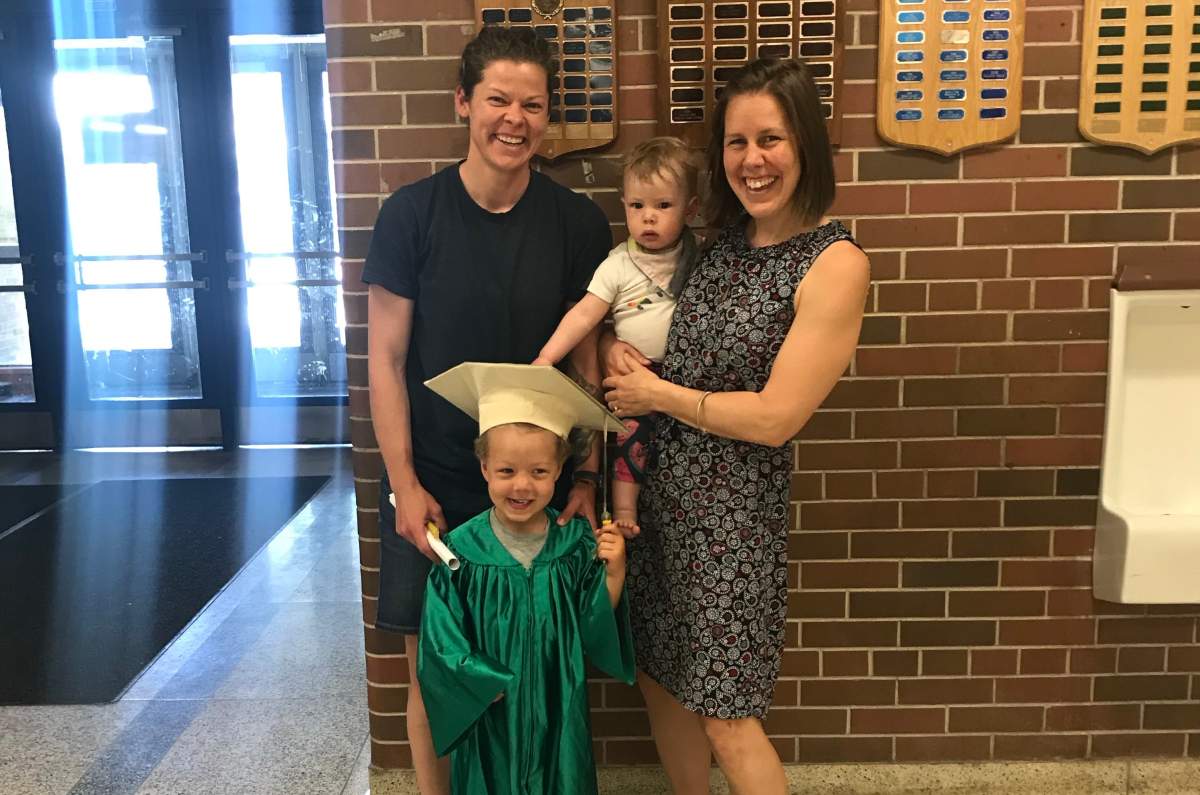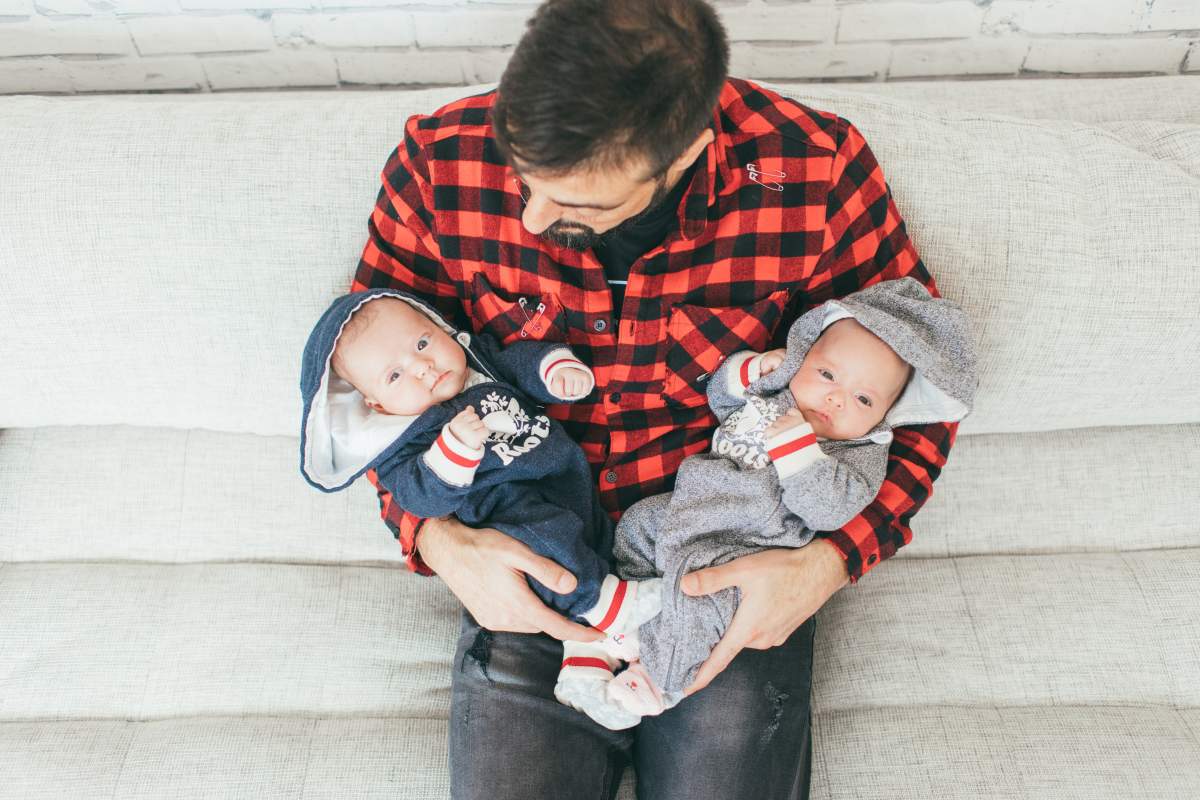You might expect couples to use their wedding gift money to set up their new home, or perhaps cover the cost of their honeymoon.

For Lindsey White and Bronwyn Whyte, though, the money went to fund fertility treatments so they could have children.
Indeed, White says she can imagine how the process would be out of reach for a lot of couples hoping to conceive.
READ MORE: ‘No black, no Asian’ — Racism in the LGBTQ2 dating community
That was eight years ago. Today, White and her partner are the parents of two sons: a four-year-old and a one-year-old. White carried both of their children.
“We started by taking weekend intensive courses to learn about our options and we learned about different fertility clinics that can help us grow our family,” she says.
By 2015, the couple was ready to start researching sperm banks, and they settled on an American one. In the U.S., sperm banks are allowed to pay for donations so more Americans are likely to donate. White and Whyte believed this would give them more diverse options.
But it wasn’t easy, White recalls.

Get breaking National news
“It was very overwhelming for me so Bronwyn narrowed the donors down to 10 and then we picked it together,” White says.
It’s a common sentiment. LGBTQ2 couples and single parents may be overwhelmed by their options when trying to conceive.
And the numbers show that same-sex couples are far less likely to have children than opposite-sex couples.
READ MORE: Are apps making it harder for gay men to date?
In the 2016 census, Statistics Canada said there were 72,880 same-sex couples in the country, and they represented 0.9 per cent of all couples in Canada. About one‑eighth of same-sex couples, 12 per cent, had children living with them, compared with about half (51.4 per cent) of opposite‑sex couples.
According to Fertility Law Canada, lesbian mothers and two-mom families have two options: a sperm bank donor or a known sperm donor. Sperm bank donors have already done the paperwork and screenings required by Health Canada in order to donate, while known donors are required to do tests to qualify to be a donor.
Nurse practitioner Eileen McMahon for Mount Sinai Hospital in Toronto helps provide information to patients and families about fertility preservation. McMahon is also chair of the hospital’s LGBTQ2 care advisory committee, a group that focuses on providing fertility care for LGBTQ2 patients.
“Some LGBTQ patients and single patients may not necessarily present with infertility, but infertility could be a part of the picture because it can happen to anybody,” McMahon says.
At Mount Sinai, McMahon says couples and single parents would need a referral from a primary care provider in order to see a fertility specialist. There is a wait list if the primary care provider requires a specific doctor.
McMahon says the wait list for the first appointment and investigations could take up to a month or two. The clinic also helps transgender patients to come off of testosterone.
Dr. Marjorie Dixon of Anova Fertility and Reproductive Health clinic in North York helps LGBTQ2 couples and single parents with fertility issues and surrogacy.
READ MORE: Coming out later in life — ‘I was finally an authentic human being’
Dixon sees a lot of young trans people who are interested in preserving their eggs so they have the option of having kids before they go on estrogen for a long period of time.
“It’s much different for trans women because it’s conserving sperm, as it is for a trans man who wants to preserve eggs,” Dixon says.
Joseph Tito, a single father from Toronto, took an alternative route. He travelled to Kenya and found a surrogate mother. His twin girls Stella and Mia Tito were born on Nov. 30, 2018.
Tito, who publishes a blog called The Dad Diaries, told Global News there was a time he never thought he’d be a father. He recalls the shock of the moment when his surrogate told him he was having twins.
“I was in the Middle East at the time and I just sat in front of my computer,” he recalls. “It was 4 a.m. and I waited until 6 a.m. to call my parents. I was freaking out because I am a single dad. The news came off as a total surprise and shock.”
Tito struggled to bring his twins home to Canada because there was a question over their citizenship. The issue made headlines at the time, but the twins finally arrived in Canada in December 2018.
READ MORE: ‘An experience like no other’ — Finding love and intimacy as a trans person
Tito believes that single parenting has changed his entire life. He used to live in a loft in downtown Toronto and since his girls were born, he bought a house in Vaughan to be closer to his parents.
“Dating was impossible before, but now, I’m like, forget about it,” he said. “Parenting has given me more patience because I was a very impatient person. I want my kids to have a backyard and I want my kids to be close with their grandparents.”












Comments
Want to discuss? Please read our Commenting Policy first.